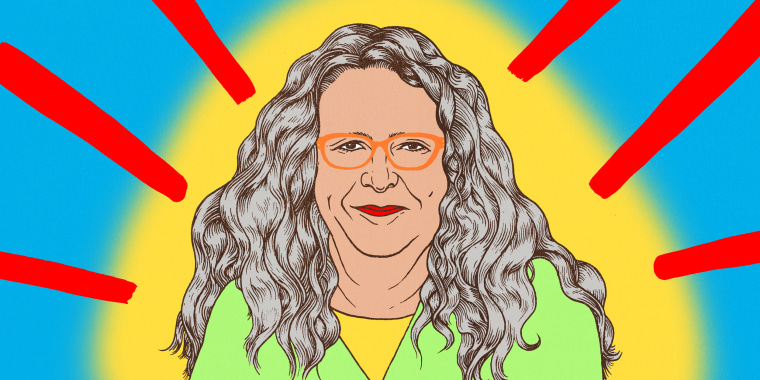Dr. Rachel Levine’s face is splashed across the news in Pennsylvania almost daily. Unlike neighboring New York and New Jersey, where governors have taken a central role in delivering updates on the coronavirus pandemic, Pennsylvania has largely left briefings to Levine, the state’s health secretary — and the most prominent transgender public official in the United States.
“Our secretary of health is as visible as our governor these days,” state Rep. Brian Sims, D-Philadelphia, told NBC News.
In her role as the state’s chief coronavirus communicator, Levine has earned high marks from Pennsylvanians and local media. The Pittsburgh Post-Gazette called her “the calm in the eye of the COVID-19 storm,” while PennLive said she offers both “calm” and “reassurance.”
"I hope that by being a public figure and being secretary of health during this public health crisis, that that educates people about LGBTQ individuals and transgender individuals."
Dr. Rachel Levine
For a physician who spent a career in academia before accepting the job of Pennsylvania physician general in 2015, Levine is facing the challenge of a lifetime as she leads one of America’s biggest states, with one of the country’s largest cities, through the coronavirus pandemic, all while under intense scrutiny from a frightened public.
“I’ve been in the public eye now for well over five years — at first as an openly transgender woman, as physician general and then secretary of health,” Levine said. “The political aspect is not new to me.”
As for the influence she hopes to have by being openly trans, Levine said she likes to quote Yoda, the Jedi master: “Fear is the path to the dark side. Fear leads to anger, anger leads to hate and hate leads to suffering.”
“People fear what they don’t understand, and obviously they have a heightened sense of fear and anxiety given the uncertainties of our times,” Levine said. “I hope that by being a public figure and being secretary of health during this public health crisis, that that educates people about LGBTQ individuals and transgender individuals — and if they are educated, then they fear less. Thus, they get less angry, and thus, they hate less.”
Sims said he first met Levine over a decade ago when he was trying to recruit her, then an academic physician at Penn State’s medical school, to join the board of Equality Pennsylvania, a statewide LGBTQ advocacy group. At that early meeting, he said he was struck by her ability to communicate and empathize.
“She’s an expert at conveying very complex information in very digestible ways, and that seems universal,” Sims said, describing her as “disarming, charming” and “all substance, all the time.”
Sims recalled what he described as a “national move” by Levine in October 2015 when the then-Pennsylvania physician general shocked the state by invoking a rarely used power to issue a “standing order” prescription for every Pennsylvanian for naloxone, the opioid-overdose-reversal medication.
“As members of our legislature debated whether or not addicts were worthy of saving, the secretary of health stepped in and, as clearly and cleanly as she does now, both explained the public health implications of naloxone and protecting people from overdosing,” Sims said, recalling Levine’s actions.
Out on the Frontline: Dr. Rachel Levine is one of NBC Out's 2020 Pride Month honorees. To see the full list, click here.
Levine agreed that coming in “clean” from the world of academic medicine, with no prior political baggage, helped her to think up creative solutions to stubborn problems.
“Everybody looked at me like, ‘That’s crazy!’” Levine said. “And then eventually after being vetted by 475 attorneys, we found that actually you can do that,” Levine said.
After she elevated to the position of acting secretary of health in 2017, Levine had to concern herself with more than just medical advice: Budgets, human resources, legislation and the media were now in her purview. Before the coronavirus pandemic, Levine’s department was busy with establishing the state’s medical marijuana program, licensing nursing homes and responding to the opioid crisis — which Levine described as “one of our biggest priorities.”
But in just a few short months, the pandemic outstripped the opioid crisis’ typical annual death toll in the state: More than 5,000 Pennsylvanians have died from COVID-19 so far this year.
In one very crucial way, the opioid crisis prepared Levine for the pandemic response: It utilized an “opioid command center,” which brought together multiple state agencies into a unified decision-making group that was empowered to respond to emergencies.
In February, the state activated a virtual incident command center and began planning to open a coronavirus command center, which began physical operations in early March at the Harrisburg headquarters of the Pennsylvania Emergency Management Agency, where Levine and other officials have been working since.
“That experience in a command center structure was extremely valuable,” she said, describing the collaboration that occurs in them as “the best weapon we learned in the opioid crisis.”
Another thing that Levine said has helped her confront the current public health crisis is her experience in academics.
“That ability as a teacher, I think, has served me very well in this setting to try to educate the public about this virus and about basics about epidemiology and exponential growth and bending the curve,” Levine said.
Pennsylvanians seem to like what they are hearing: In the three months since she began to serve as the chief coronavirus communicator for the state, Levine is earning high marks. A Washington Post-Ipsos poll from mid-May found that over 70 percent of Pennsylvanians approve of the job the state’s governor is doing in response to the pandemic. And Levine boosters, like Sims, are not-so-quietly whispering the words “surgeon general” ahead of the 2020 presidential election.



